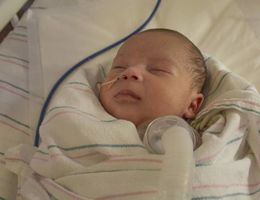Coming Soon: New Building for Children's Specialty Care
Our new Children's Health Specialty Clinics building will bring 30 pediatric specialties together under one roof, making it easier for families to get expert care.
Loma Linda University Children’s Health offers state-of-the-art fetal cardiology services. Our expert team will use the latest technological advances to ensure your baby’s heart is receiving top-notch care, both before and after delivery.
A fetal echocardiogram, sometimes called a fetal echo, tests the structure and function of the fetal heart. It can detect heart abnormalities before birth, allowing for faster and more efficient medical intervention. Like other prenatal exams, it uses safe ultrasound technology and takes one to two hours to complete. The test is performed by a sonographer specially trained in fetal cardiology and reviewed by a pediatric cardiologist. If the position of the fetus does not allow for a clear picture, additional visits may be necessary.
If any heart problems are found on the fetal echocardiogram, you will be referred to the fetal cardiac team. Your obstetrician or maternal fetal medicine (MFM) doctor are also notified and will attempt to deliver the baby as close to the due date as possible. Early delivery is generally not recommended.
Having a prenatal diagnosis helps parents plan for delivery and improves a baby’s chance of survival if there is a life threatening heart defect. It also allows a family to meet with the neonatal intensive care (NICU) team and heart surgeons before delivery and allows for mother and baby to be at the same hospital for delivery, neonatal care and heart surgery.
Call us to make a fetal cardiology appointment if you meet any of the following criteria.
A fetal echocardiogram is usually performed between 18-22 weeks gestation, although it may be performed as early as 13 weeks. When any of the risk factors here are present, it is critical to request a fetal echocardiogram as early as possible. Patients and referring physicians are encouraged to contact us to make an appointment or request more information.

A fetal echocardiogram, sometimes called a fetal echo, tests the structure and function of the fetal heart. It can detect heart abnormalities before birth, allowing for faster and more efficient medical intervention. Like other prenatal exams, it uses safe ultrasound technology and takes one to two hours to complete. The test is performed by a sonographer specially trained in fetal cardiology and reviewed by a pediatric cardiologist. If the position of the fetus does not allow for a clear picture, additional visits may be necessary.
If any heart problems are found on the fetal echocardiogram, you will be referred to the fetal cardiac team. Your obstetrician or maternal fetal medicine (MFM) doctor are also notified and will attempt to deliver the baby as close to the due date as possible. Early delivery is generally not recommended.
Having a prenatal diagnosis helps parents plan for delivery and improves a baby’s chance of survival if there is a life threatening heart defect. It also allows a family to meet with the neonatal intensive care (NICU) team and heart surgeons before delivery and allows for mother and baby to be at the same hospital for delivery, neonatal care and heart surgery.
Call us to make a fetal cardiology appointment if you meet any of the following criteria.
A fetal echocardiogram is usually performed between 18-22 weeks gestation, although it may be performed as early as 13 weeks. When any of the risk factors here are present, it is critical to request a fetal echocardiogram as early as possible. Patients and referring physicians are encouraged to contact us to make an appointment or request more information.

Our new Children's Health Specialty Clinics building will bring 30 pediatric specialties together under one roof, making it easier for families to get expert care.